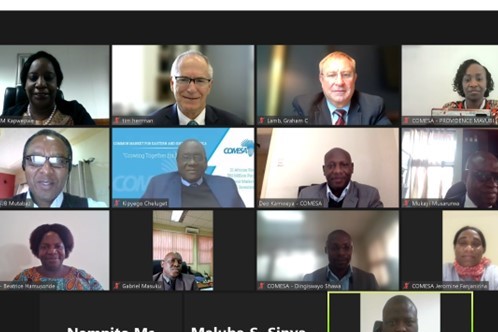LUSAKA– COMESA and Texas A&M Agrilife Research, USA have signed a Memorandum of Understanding [MoU] to support mycotoxin risk management involving aflatoxins and fumonisins for trade commodities and staples. This is a key pillar of mutual recognition of certificates of analysis amongst trading countries.
Aflatoxins and fumonisins are naturally occurring toxins and comprise key Sanitary and Phytosanitary [SPS] issues of trade concern in the COMESA region. The COMESA-AgriLife collaboration also supports the technical activities under the COMESA/Alliance for a Green Revolution in Africa project on ‘Enhancing Regional Agricultural Commodity Trade in COMESA’.
COMESA Secretary General Chileshe Kapwepwe and Texas A&M Agrilife Research Director Dr. Cliff Lamb recently signed the MoU in a virtual event conducted in Lusaka, Zambia and Texas, USA, Monday 27 June 2022. Implementation of the MoU activities kicks off next month with the first PT Rounds of testing.
The key areas of cooperation relate to Non-Tariff Barriers [NTBs] to trade such as the SPS and Technical Barriers to Trade (TBTs) which are estimated to account for 70 percent of the NTBs within the COMESA Region. Among these are un-affordable and cumbersome conformity assessment systems, laboratory testing, certification schemes, inspection, market surveillance and sampling. Through the COMESA-AgriLife collaboration outlined in the MoU, the application of regulatory science will help minimize these barriers and build capacity to measure and manage aflatoxin and fumonisin risk.
There exists limited laboratory testing capacity in the region and competent and skilled laboratory technical staff in both the public sector and in small-and medium-size enterprises (SMEs) to accurately measure and manage mycotoxins. To process a transaction, traders in COMESA Member States go through cumbersome procedures in obtaining sanitary and Phyto-sanitary measures documents, quality certificates and other documents.
Speaking during the signing ceremony, Madam Kapwepwe cited the above impediments as having contributed to the low intra-regional trade in COMESA and affecting the region’s competitiveness in agriculture products in the domestic, regional and international markets.
“The areas of cooperation outlined in the MoU document are very critical, pertinent, and timely as they seek to address key challenges that COMESA Member States continue to face especially on the low levels of trade at regional, continental and global levels,” she said.
In his remarks, Dr Lamb described the partnership as a tremendous opportunity to facilitate economic growth in the region, which COMESA oversees, that will benefit the population and the agriculturists of Texas.
“For us engaging in an MoU with COMESA will enhance the capacities of all the countries within the region and also help Texas A&M Agrilife in multiple ways for global food security and food safety, which are really important for us,” said Dr Lamb.
Specific areas of cooperation enunciated in the MoU include a co-regulation driven regulatory regime for trade in aflatoxin and fumonisin safe staples (maize, soya bean, sorghum and groundnuts) and the Aflatoxin Proficiency Testing and Control in Africa programme (APTECA). Elements within APTECA include capacity building through a competency framework for regulators, conformity assessment through proficiency testing (PT) rounds and technical training sessions.
AgriLife is uniquely positioned to provide this technical support through the Office of the Texas State Chemist (OTSC), which provides regulatory oversight for the Texas feed and fertilize industry. The unique relationship of a regulatory agency housed within AgriLife Research is the academic component of systematizing knowledge and practices that can be extended globally, according to Dr. Tim Herrman, Professor, State Chemist and Director of OTSC, who also participated in the signing ceremony.
Under the pact, there will also be virtual training courses in regulatory science in food systems, laboratory quality management systems, and risk-based approaches to regulation, which will be done in collaboration with the COMESA Virtual University.
The collaboration initiative started in 2015 when the COMESA Secretariat facilitated the participation of 12 regulatory testing laboratories from six Member States; Kenya, Uganda, Rwanda, Malawi, Zambia and Zimbabwe in the APTECA programme, which was run by Texas A&M Agrilife Research. At 16 Member States are targeted to participate in the new Rounds of the APTECA PT Scheme.
https://thecooperator.news/agra-comesa-to-collaborate-in-promoting-agriculture-productivity/
Buy your copy of theCooperator magazine from one of our countrywide vending points or an e-copy on emag.thecooperator.news
